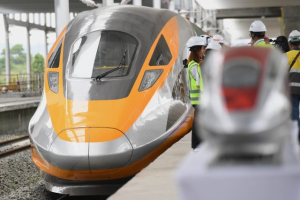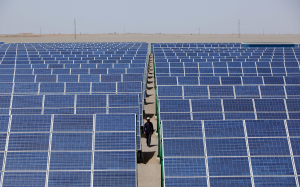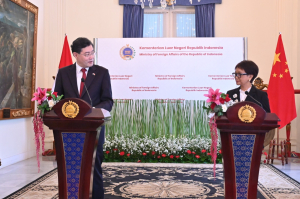China demands Indonesian state budget guarantee on high-speed train raises debt trap concerns
The Coordinating Minister for Maritime Affairs and Investment, Luhut Binsar Pandjaitan, revealed that the China Development Bank (CDB) has asked for guarantees through the State Revenue and Expenditure Budget (APBN) to provide loans for the Jakarta-Bandung high-speed train (KCJB) project.
With this scheme, CBD will receive loan payments from the APBN if Indonesia is unable to pay the principal and interest on the loan.
On the other hand, Luhut recommended that the guarantee be carried out through PT Penjaminan Infrastruktur Indonesia (Persero) or PT PII.
"Indeed there are still psychological problems, yes, so they [China] want it from the APBN, but we explain that the procedure will be lengthy. We are pushing through PT PII because this is a new structure created by the Indonesian government since 2018,” Luhut said on Monday (10/4).
Previously, Luhut left for Beijing to to negotiate with CDB to lower the loan interest rate from 4 percent to 2 percent. However, the CDB refused and decided to only lower it to 3.4 percent.
Following the decision, Deputy Minister of State-Owned Enterprise Kartika Wirjoatmodjo said that Indonesia again attempting to engage in negotiation with CDB to lower the loan interest rate.
“We are negotiating again [by proposing] a guarantee scheme. So hopefully in the next two weeks, we get a clearer response from them,” Kartika said on Wednesday (12/4).
At present, the government is preparing an agreement scheme so that the loan interest rate could drop to 3 percent. The government will no longer persuade the Chinese bank to cut the loan interest rate to 2 percent as it is already reasonable given the current treasury rate that has risen from 2 to 4 to 5 percent.
Concerns on Chinese debt trap
In September 2015, Indonesia approved China’s proposal for the construction of a high-speed train project connecting Jakarta and Bandung, with an early investment plan of US$6.071 billion.
However, there is growing concern that the country would fall into a debt trap with China, due to the increasing cost overruns, especially when China recently asked for a loan guarantee from the APBN.
Executive Director of Celios, Bhima Yudhistira, believes that China’s desire to obtain more debt through APBN guarantees is not without reason. This is due to the fact that APBN is considered the most secure form of guarantee.
Meanwhile, guarantees provided by PT PII as Public Service Agency (BLU) under the government are considered insufficient to secure large loan amounts due their inherent limitations.
In fact, the APBN has a track record of guaranteeing development projects. However, these projects are usually carried out by state-owned enterprises or intended for the public benefit such as National Strategic Projects (PSN) and the construction of toll roads. Moreover, such projects are typically less prone to budget overruns.
As Bima stated, the criteria for government-guaranteed loans are did not match the Jakarta-Bandung high-speed train project, and it is appropriate for the government to refuse China’s request.
In line with this, researcher at Celios, Andri Perdana stated that the KCJB project should not use any part of the APBN. As Andri explained, the KCJB is a business to business project with debts attributed to KCIC (Kereta Cepat Indonesia China). Therefore, the KCIC are obliged to pay and take responsibility for all debts related to the KCJB project.
Meanwhile, using APBN to pay for the debt will burden the fiscal budget for decades, with the feasibility of the project being questioned as irrational.
Related to negotiations for a lower loan interest rate, Andri also expressed his concerns that China will refuse to lower it because they knew that the Indonesian government would persist in continuing the KCJB project.
In the end, Indonesia may have no choice to accept the burden of cost overrun interest rate, which was far from the initial agreement for the project, said Andri.
Therefore, it is crucial to consider the long-term consequences of such a decision. It could potentially put the government in a vulnerable position, leading to a debt trap similar to what happened in Sri Lanka and other countries. Sri Lanka for example, were unable to pay off their debt attached to a port project, which was then taken over by China.
In the cases of several African countries, the government had to pay back the debt through access to oil and gas and mineral resources because they failed to pay the debts to China.
Therefore, Indonesia might be careful with China's help with development and technical assistance.
Already have an account? Sign In
-
Start reading
Freemium
-
Monthly Subscription
20% OFF$29.75
$37.19/MonthCancel anytime
This offer is open to all new subscribers!
Subscribe now -
Yearly Subscription
33% OFF$228.13
$340.5/YearCancel anytime
This offer is open to all new subscribers!
Subscribe now







